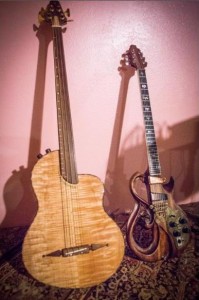Turning Vision into Value
The Silicon Valley Innovation Institute is all about innovation, whatever the form. Last week, we had a fabulous event focusing on innovation in music–specifically, as the title of the event asked, “How is technology changing music?”
The evening began with casual mingling and chatting. During this time, even though they were not an official part of the program, the entrepreneurs from Unplugged Instruments got the night off to a good start by showing off their super cool self-amplifying guitar (available through kickstarter).
Then we had dinner from the fine fare of Angelica’s Bistro (also the location of this event) while music was played by Scot Sier and Andy Markham, followed by a stunning Bolero dance by Roland Van Der Veen and Jessie Chen.
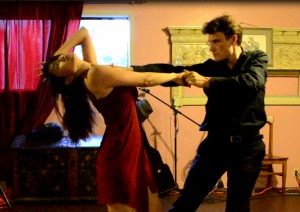
All this happened before the main program, which was an extended exploration of how technology is changing music (for better or for worse). Mostly, it was agreed that technology is helping music by, as SVII founder Howard Lieberman put it, “lowering the barriers to entry and allowing artists to reach more people with their music.” However, there were also some hints that it may not all be good. For example, Andy Markham, a guitarist from The Cat Mary, pointed out that “There is no law of the universe that dictates that music needs to be a way of making money.” Just as brick-laying is a profession that is now all-but-extinct, in five hundred years, technology may have made music so easy to produce that being a professional musician will be an impossibility. (He didn’t necessarily say that such a scenario has to be a bad thing, but whether it is or not would probably depend on your perspective.)
One thing that is for sure is that technology has changed music immensely. Even in the change, however, one can see the cyclical nature of music (rhythm, anyone?). For example, because technology such as iTunes, Youtube, Spotify, and BitTorrent (to name a few) have made music anywhere from cheap to free online, musicians have become much more dependent on revenue from live performances, which is somewhat of an echo of past times.
Additional juxtapositions of the new and old in music and technology were also highlighted by the other panelists. Budda Amplification founder Scot Sier talked about how he got the idea for his current company: At one time, he had a tube amplifier, but then he sold it. After that he realized how much he missed it, because it sounds much better at a lower volume than other amplifiers, which is important for preserving your hearing if you are a musician. This inspired him to start a company which would actually make tube amplifiers, which before then had been a dying breed.
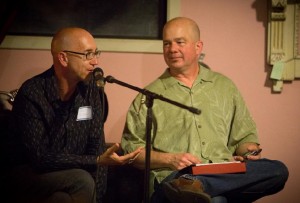
Also present were the father-son-instrument-
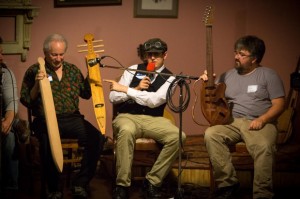
One of the highlights of the night was when Robert Hamilton of Smule showed a visualized version of people from all over the world singing “Lean on Me” together through the Smule Glee app (online karaoke and music collaboration). After the tsunami in Japan, someone in Japan posted the starter track as a way to encourage fellow Japanese people. Later, people from all over the world started hearing it and adding their own voices.
Another product that Smule makes is electronic instruments for computers–i.e, ways of playing music through your iPhone, iPad, etc. Hamilton mentioned that one of their most popular settings on the My Ocarina app for the iPhone is the Zeldarian setting, which mimics the way an ocarina in the Zelda computer game sounds, which is (as far as we know) not reproducible by an acoustic instrument. This echos something which Eli said about the flow of technology: “Technology tries to mimic the physical world, which forces us to learn more about the physical world by studying it more deeply. Then we take the physical and try to mimic technology, which forces us to learn more about technology.”
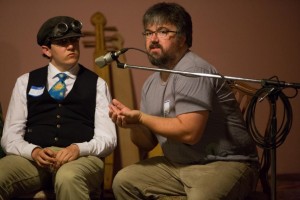
——————————————————————————————————————–
SVII is the Silicon Valley Innovation Institute. We aspire to cultivate innovation by bringing creative people of all types together in a thought-provoking environment. Our next event is July 18th, and is an opportunity for anyone to showcase their creativity and audacity in performance and art.
